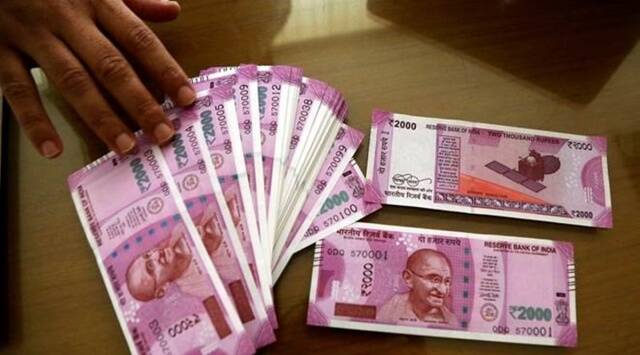Rs 2,000 note exchange: PSU banks see longer queues; banks, customers complain over lack of clarity on rules
Many customers who made large deposits after the withdrawal of Rs 500 and Rs 1,000 notes in 2016 later received income tax notices. Cash deposits above Rs one lakh in the savings account can invite income tax notices, said a bank official.
 As there are around 1.55 lakh bank branches in the country, each branch, on an average, will have to handle 11,677 pieces of Rs 2000 notes – or 116 notes per day -- between May 23 and September 30, 2023. (Express Photo)
As there are around 1.55 lakh bank branches in the country, each branch, on an average, will have to handle 11,677 pieces of Rs 2000 notes – or 116 notes per day -- between May 23 and September 30, 2023. (Express Photo) With customers queueing up at the branches of public sector banks, mainly State Bank of India, to exchange Rs 2,000 notes and private banks evidently wary about the exercise, customers and bank officials have sought the RBI intervention to set uniform rules for banks for the exchange of notes.
While public sector banks have adopted different strategies to exchange Rs 2,000 banknotes from non-account holders, private and foreign lenders have made it mandatory for such customers to submit identity proof.
The RBI instruction is very clear that the exchange of the Rs 2,000 notes across the counter should be provided to the public in the usual manner as provided earlier — without insisting on any request slip or ID proof as these notes continue to be a legal tender. “We regret to observe that some of the banks are still insisting on the public to provide a request letter along with detail of the notes, ID proof, contact number and address. This, besides being not in conformity with the RBI instructions, is creating avoidable tension and quarrel in branches by the irritated public and the concerned staff in these branches are facing the wrath of the public,” said CH Venkatachalam, General Secretary, All India Bank Employees Association.
“We do not want to recall the miseries faced by the employees and officers during the demonetisation process in 2016-17. They have suffered enough. We cannot face it anymore. We request you to once again reiterate your instructions to the banks,” AIBEA said in a letter to the RBI Governor.
Among state-run banks, maximum number of customers are queuing up at branches of State Bank of India, which are exchanging Rs 2000 notes without the need to provide any identity proof. While Union Bank of India is asking non-account holders to just bring identity proof at the time of exchange of notes, Bank of India is noting down names and mobile numbers. Non-account holders going to SBI, Union Bank and Bank of India are also not required to fill up any requisition slip to exchange notes.
However, according to a banking source, rural branches are demanding identity proof from non-account holders. This is because they have encountered some cases where counterfeit notes were deposited in the branches which went undetected. “These fake notes were identified by the currency chest later. To avoid this situation, these branches are insisting on identity proof so that the person who has exchanged fake notes can be traced,” he said.
Indian Bank and Punjab and Sind Bank are asking non-account holders to submit identity proof such as Aadhaar card, or driving license or PAN card. Axis Bank, Kotak Mahindra Bank, HDFC Bank and IDFC First Bank are exchanging Rs 2000 notes from non-account holders only if they are submitting identity proofs.
“Some of the banks are discouraging non-account holders from exchanging Rs 2000 notes at their branches,” said an official. These customers later approach SBI or other PSU banks for the exchange.
Foreign banks like Standard Chartered Bank and small finance banks like AU Finance Bank are also demanding for identity proof from non-account holders.
Withdrawal of Rs 2000 notes could see an infusion of Rs 1-1.8 lakh crore of liquidity over the June-September period, according to a Care Ratings report. Comfortable liquidity conditions could ease short-term rates going ahead, it said.
Banks are cautious about the IT Department raising questions about large cash deposits of Rs 2,000. Many customers who made large deposits after the withdrawal of Rs 500 and Rs 1,000 notes in 2016 later received income tax notices. Cash deposits above Rs one lakh in the savings account can invite income tax notices, said a bank official. “The RBI never scrutinises deposits in banks. The Income Tax Department do that. Banks have a reporting system, and they will take care of this,” RBI Governor said at a press conference recently.
As there are around 1.55 lakh bank branches in the country, each branch, on an average, will have to handle 11,677 pieces of Rs 2000 notes – or 116 notes per day — between May 23 and September 30, 2023. The whole exercise of exchange of Rs 2,000 notes may not appear as big as the demonetisation exercise in November-December 2016 when branches across the country witnessed chaotic scenes for exchange of Rs 500 and Rs 1,000 notes. Banks will have to shell out money to reconfigure ATMs and cash recyclers. There are 2.57 lakh ATMs across the country, according to RBI data.
Sharp rise in ATM withdrawals
Cash withdrawal through ATMs at Rs 2.84 lakh crore in March 2023 is an absolute growth of 235 per cent in a matter of 76 months after demonetisation, says a report from CMS Info Systems, a banking logistics provider. Maharashtra, Gujarat, Tamil Nadu, Karnataka and Uttar Pradesh together accounted for 43.1 per cent of the total ATM cash replenished by the firm across the country in FY 2023.
Karnataka saw the highest annual average cash replenishment per ATM at Rs 1.73 crore in FY 2023, which was 18.1 per cent higher than Rs 1.46 crore cash replenished per ATM during FY 2022. Chhattisgarh saw the second highest cash replenishment of Rs 1.58 crore per ATM in FY 2023, there was a decline of 2.1 per cent over Rs 1.62 crore in FY 2022
India witnessed the maximum cash usage and demand during the festive and wedding seasons between October to December in FY 2022, and during October, December and March of FY 2023.

- 01
- 02
- 03
- 04
- 05






























